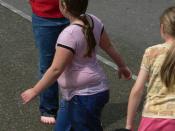The problem of childhood obesity is a serious problem that has ramifications for health at international, national, local and most importantly individual levels. This essay will discuss the problems, such as increased affluence in first world countries, lack of education of correct eating habits and nutritional information, and reduced use of physical activity as recreation with increased use of technological recreation such as computer and TV games, which are contributing to the epidemic spreading of obesity in children at all levels.
Obesity has both economic and health consequences for our children. These economic and health consequences which if are not rectified in childhood are carried into adult life with their own ongoing problems. Obesity affects not only the physical wellbeing but also the social and emotional wellbeing of our children. The social and emotional wellbeing of our children is important so that they may carry into adult life the right ideas and frame of mind about their own physical identity.
With the problems identified we will make recommendations on how to reduce childhood obesity with reference to the resources available.
The definition and diagnosis of obesity in children and adolescents is difficult and subject to a lot of controversy (Kiess et al 2001 p30) Waist circumference, skin-fold thickness and body mass index are looked at and also the young persons ethnic background, gender and developmental stage, define whether or not a young person is over-weight or has obesity. For many families the word "obese" still carries the stigma of being lazy of weak and is a forbidden word in the household (Healthy Kids Challenge, 2005 p2).Very few countries have presented data on obesity rates in children partly because of the lack of acceptable standards for assessing weight status in children (WHO 2005).
Having a little extra weight on does not...



Obesity in children.....serious problem....
No references otherwise is okay.
1 out of 1 people found this comment useful.